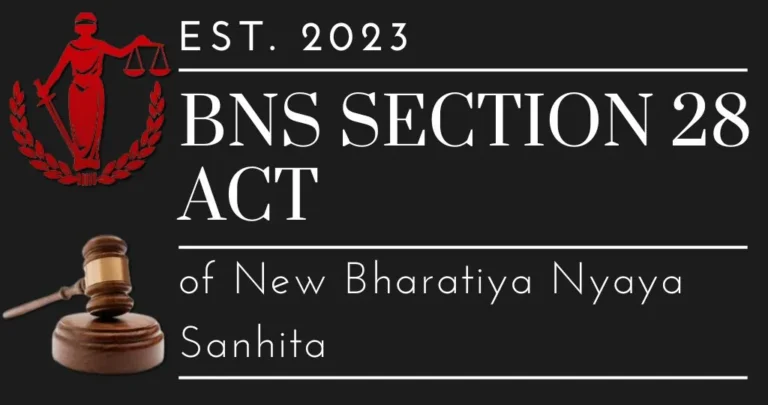
The Legal Implications of Harbouring or Concealing Escaped Offenders: Section 253 of the Bharatiya Nyaya Sanhita, 2023
The Legal Consequences of Concealing or Harbouring Escaped Offenders: Section 253 of the Bharatiya Nyaya Sanhita, 2023
The Bharatiya Nyaya Sanhita, 2023, that came into force on July 1, 2024, replacing the Indian Penal Code, contains provisions that aim to counter situations where an individual tries to hide a criminal from being taken into custody or brought to trial. Section 253 addresses the crime of harbouring or concealing an individual who has escaped from lawful custody or is wanted by the authorities. It establishes the penalties for doing so in terms of the seriousness of the initial offence committed by the person being concealed.
Knowing Section 253
For More Updates & Regular Notes Join Our Whats App Group (https://chat.whatsapp.com/DkucckgAEJbCtXwXr2yIt0) and Telegram Group ( https://t.me/legalmaestroeducators ) contact@legalmaestros.com.
Section 253 of the Bharatiya Nyaya Sanhita provides for punishment against anyone who shelters or hides an individual who has escaped lawful custody or who is wanted for a crime. Such harbouring is punished under the law according to the gravity of the crime for which the individual was in custody or for which he/she was directed to be arrested. This part addresses not only crimes committed in India but also crimes committed abroad that would have attracted criminal charges if they had been committed in India.
Main Points of Section 253:
Punishment for Harbouring or Concealing When the Offence Is Punishable with Death
If someone assists in hiding or harboring an escaped criminal who was initially charged or convicted of a capital offense, they can be imprisoned for a maximum of seven years and could also be fined. For instance, if someone assists a convicted murderer in concealing themselves after they escape from prison, they might be seriously imprisoned because of the seriousness of the initial crime.
Punishment When the Offence Is Punishable with Life Imprisonment or With Up to Ten Years
In the case where the escaped offender is charged or convicted of an offense carrying a term of life imprisonment or a sentence not exceeding ten years, then the individual shielding them may have to be punished for up to three years of imprisonment, either with or without further fine. For example, if one were to aid someone who was sentenced to life on account of some grave offense like grand fraud or armed robbery, then the beneficiary would be punished in accordance with the stipulated penalty.
Punishment When the Offence Is Punishable With Less Than Ten Years but With More Than One Year
Where the original offence for which the individual was held in custody attracts a maximum imprisonment of less than ten years but more than one year, the punishment for concealing or harbouring the said individual is an imprisonment of a term not exceeding one-fourth of the maximum term of imprisonment provided for the original offence. Moreover, the individual can also be fined, or both fine and imprisonment can ensue. To illustrate, suppose the original crime was four years’ imprisonment, then the accomplice would themselves be sentenced for up to a year’s imprisonment for harbouring them.
Explanation: Inclusion of Acts Perpetrated Beyond India
It also includes the acts committed abroad that would also be considered as a crime if done in India. If an individual has committed an offence in a foreign country for which they can be detained under Indian law, giving shelter to them would entail the same consequences as though the offence had been committed in India. For instance, if someone committed an offense in a foreign country that is also an offense in India, like trafficking or terrorism, and someone in India assists in concealing them, then the latter would be culpable under Section 253.
Exception for Spouses
The exception is given to spouses, such that if the harboured or concealed offender is their spouse, then the provisions of this section do not apply. This exception is made because the law recognises that there is a special and close relationship between spouses and also because it is nearly impossible to force one spouse to betray the other in such situations.
Examples to Illustrate the Application of Section 253
Harbouring a Convicted Murderer
Let’s assume that Rajesh is found guilty of murder, an offense punishable by death in India. Rajesh escapes from jail. If someone hides him in their home or gives him money to live incognito, such a person can be imprisoned for a maximum of seven years and can also be fined under Section 253.
Aiding an Offender Convicted of Serious Fraud
Suppose there is an individual called Anjali who is on trial for a serious fraud offence that has a possible sentence of life imprisonment. She breaks out of custody while on the way to court. If a friend provides her with refuge aware of the escape, they may be sentenced to a maximum of three years’ imprisonment for helping her.
Concealing a Person Involved in a Minor Offence
Let’s say Ravi is accused of an offence for which he can get a maximum prison term of two years. If Ravi evades police custody and a neighbor provides him with shelter for a couple of days, the neighbor might be given a prison sentence of up to six months (one-fourth of the maximum of two years) for helping Ravi.
Brief Overview of Related Sections
Section 253 is one of a set of provisions under the Bharatiya Nyaya Sanhita that cover harbouring offenders:
Section 249 makes the act of harbouring an individual knowing they have committed an offence punishable, with punishments varying according to the severity of the initial crime.
Section 250 criminalises anyone who receives a gift or reward in return for assisting in concealing an offender.
Section 251 comes into play when an individual offers or promises to provide a bribe in exchange for assistance in covering up an offender.
All of these sections serve to discourage the public from obstructing the process of justice by covering up criminals or assisting in their evasion of punishment.
The Importance of Section 253 in Criminal Law
The incorporation of Section 253 in the Bharatiya Nyaya Sanhita underscores the need to maintain the justice process. By punishing those who help criminals escape justice, the law aims to avoid any hindrance to the arrest and prosecution of criminals. It enforces the rule that all those participating in the criminal justice process should do so in a manner that assists the law and not hinders it.
Conclusion
Section 253 of the Bharatiya Nyaya Sanhita, 2023 is an important provision to prevent harbouring escaped offenders or wanted offenders by the authorities. It prescribes clear-cut punishments for people who obstruct the arrest of criminals, while allowing some degree of leniency for spouses caught in such circumstances because of their marital relationship. By covering the different situations in which harbouring is possible, this section makes the criminal justice system more robust and ensures that those who break out of lawful custody or flee arrest cannot easily find shelter.






